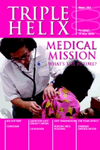Helen Perry, a Jehovah's Witness from Shropshire, has become the first woman in Britain to have a baby using a frozen egg, due to a new anti-freeze method that increases egg survival rates. Over 100 babies have now been born from frozen eggs worldwide, and new results presented on 15 October 2002 by the Florida Institute of Reproductive Medicine, at the Seattle conference of the American Society for Reproductive Medicine, could overturn conventional wisdom about egg freezing being too risky or complicated. Pregnancy rates of 47% were close to the 58% achieved using fresh eggs.
Although the study size was small (only 14 births thus far), if duplicated in larger trials and confirmed to be safe, the new technology will be good news for women undergoing cancer treatments that put fertility at risk; and could significantly raise reproductive chances after chemotherapy or radiotherapy. It may also save women with tubal infertility having to undergo repeated eggharvesting procedures.
From an ethical point of view it is also far preferable to other fertility techniques involving egg donation or embryo freezing. Embryos are human beings worthy of the utmost respect. Eggs are not; and provided the technology doesn't lead to a higher rate of congenital abnormalities as embryo freezing has, it will be a good advance. If you can freeze eggs there seems little reason to freeze embryos.
But like all new technologies there is potential for abuse. It should be reserved for those with genuine medical reasons for being unable to have children; and not misused by those who wish to postpone childbearing in their own, rather than their children's, interests.
This new advance is a step back in the right direction but it does not go far enough. A review the HFE Act in the light of recent high-profile fertility treatment fiascos is long overdue.
































